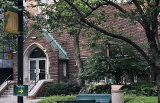Contaminated Surgical Equipment: At Least 13 Patients At Risk of Incurable and Rare Brain Disease Due to Medical Sanitation Issue
ByAs many as 13 patients in Cape Cod and New Hampshire may have been exposed to a deadly and incurable brain disease after surgeons used a contaminated instrument on their spinal surgeries, the Boston Globe reported.
First, eight patients in a N.H. hospital were reported to have been treated at Catholic Medical Center in Manchester between May and August with the contaminated equipment. Five others were reportedly also treated, but it was unknown at the time where.
The Globe reported Friday that five patients from Cape Cop Hospital were also treated with the contaminated instrument during their surgeries.
The instrument is a needle-shaped probe used to make complex surgery easier for the surgeon. It was used on a patient in N.H. in May and that person developed symptoms consistent with Creutzfeldt-Jakob disease and died in August.
Cape Cod Hospital and Catholic Medical Center both borrowed the equipment from the Minneapolis-based manufacturer Medtronic. Cape Cod surgeons used the equipment to perform five spinal surgeries and the N.H. doctors used them for eight operations.
The instruments suspected of being contaminated will be quarantined, but health officials said the 13 patients who were potentially exposed have a low risk of becoming infected.
"It's as close to zero as you can get," said state epidemiologist Dr. Al DeMaria. "If I was a patient I would not consider myself at risk."
However, he said patients who were notified of their risk have a legitimate reason to be anxious, adding, "I would worry about it."
There is not a known cure for Creutzfeldt-Jakob disease, which slowly eats away at the brain, sometimes over several years. Patients often experience their brain deteriorate with symptoms similar to dementia, often lapsing into a coma.
"Those patients [who were notified] will be followed in our office for quite some time,'' said Dr. Paul Houle, chief of neurosurgery at Cape Cod Hospital.
About 200 cases of Creutzfeldt-Jakob disease are reported in the U.S. every year, but it is not like the majority of infectious disease. It is not caused by a virus, a bacteria or a fungus, but by abnormal proteins called prions.
Gigi Dash, director of infection prevention at the hospital, said it is not possible to ensure each and every prion has been cleaned off of a sterilized instrument. She said the hospital did everything it was supposed to do and warned the patients despite the considerably low risk.
"Is it absolutely sure there is not one prion remaining? No it's not absolutely sure," Dash said. "That is one of the reasons we contacted our patients."
© 2026 University Herald, All rights reserved. Do not reproduce without permission.








